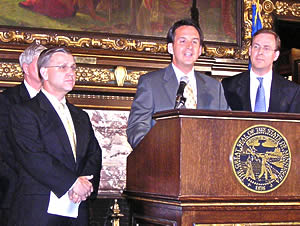July 9, 2005
 |
| Gov. Pawlenty and legislative leaders were all smiles again after more than a week of tension and harsh words. (MPR Photo/Tom Scheck) |
St. Paul, Minn. — After negotiating all day Friday and into Saturday morning, Gov. Pawlenty and the four caucus leaders announced the agreement at 2 a.m. The deal includes more money for schools, keeps people on state subsidized insurance and sends about 9,000 state employees back to work immediately.
"This agreement makes me feel like the parent of a teenager who has come home late," Pawlenty said. "It is way past curfew but I'm glad they're here safe but I'm mad they're late. It's a good thing that this deal has been done and it's a good deal for Minnesota."
Negotiations between Pawlenty and legislative leaders have been rough and tumble over the last several weeks. Lawmakers lost their cool and pointed fingers at each other at times as negotiations became more intense.
Pawlenty and the Republican controlled House were pushing for deeper cuts to health care programs while pushing for increases to schools. DFLers were pushing to protect or increase those programs by raising taxes.
DFL Senate Majority Leader Dean Johnson says his caucus protected health programs and increased school funding.
"Minnesota is passionate about our children and their education. We care deeply about our health care system. And that's the reason we have taken so much time and effort to come forth with a compromised budget negotiated bill this evening," Johnson said.
The agreement calls for a 75-cent-a-pack tobacco tax increase, property tax increases and closing some abusive tax shelters.
Schools will see an annual 4-percent increase in funding over the next two years. A limited number of school districts will also be able to switch to a new system for paying teachers. The so-called Q comp program would base teacher pay on classroom performance rather than years of service.
DFL House Minority Leader Matt Entenza of St. Paul says everyone on MinnesotaCare will still be eligible for the health insurance program. It would also increase funding for nursing homes and other long-term care facilities.
"There is no doubt that this was a frustrating, ugly and difficult process to watch. But winners have emerged and they are our schools, our children and health care for working Minnesotans," according to Entenza.
The agreement does not mean work at the Capitol is over. Pawlenty and the leaders agreed on a basic framework but House/Senate working groups now have to negotiate the details.
Republican House Speaker Steve Sviggum of Kenyon says those groups will meet over the weekend with the overall hope of having everything wrapped up quickly.
"We hope to be done on Wednesday of this week. With this handshake agreement, with this signed agreement, Minnesota is back at work," Sviggum said.
The continuing budget resolution means 9,0000 state employees will be back at work at least thru Wednesday. That's good news to Eliot Seide, with the American Federation of State, County and Municipal Employees. As a result of a shutdown, many of his members have been furloughed and have been forced to use vacation and comp time to account for their forced absences. "Our unions, our members worked very hard to get our people back to work. The key thing right now at 2:25 this morning is that state employees are going back to work in the morning and our members need to go back to work," he said.
Not everyone is happy with the final agreement. The so-called racino didn't make it into the final deal. Pawlenty and House Republicans have been pushing for slot machines at Canterbury Park but dropped the measure after House and Senate DFLers objected. Canterbury Park Race Track President Randy Sampson says he's disappointed.
"This has been a rollercoaster ride. As you know we've been in the mix, and then out and then back in and out. It's been a frustrating couple of months," he said.
It's unlikely that several other hot button topics will be brought up during the special session. Pawlenty and leaders say stadium plans for the Twins and Gophers will have to wait.








